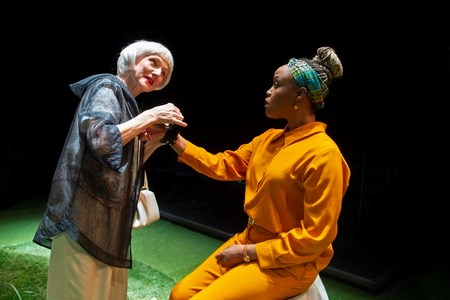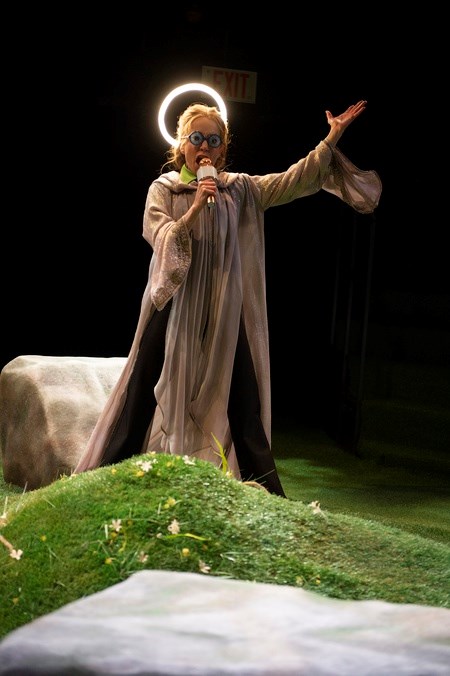
What happens when your number comes up in the lottery of life? What do you say when standing face-to-face with death? How do you feel about the life you have lived to that point? Where do you go when it’s all over, and how do you get there? Is it true you can’t take it with you?
Playwright Branden Jacob-Jenkins’ Everybody, an adaptation of the 15th century morality play Everyman, asks these deep questions and many more over 90 minutes of thought-provoking entertainment at Shaw Festival’s Jackie Maxwell Studio Theatre.

It’s a brilliantly creative production, helmed by director László Bérczes, that uses the black-box theatre space to its full advantage.
The audience surrounds the sparse set, with just the tree of life and less than a handful of small props at its centre. Actors sit incognito next to theatre-goers, awaiting their cue to reveal themselves as part of the production. It has the effect of making the audience part of the play, connecting them to the characters and more deeply experiencing what each is going through.
The play begins with the audience addressed by an usher. In fact, it’s Deborah Hay as Usher, dressed in the same garb as those who led theatre-goers to their seats. She explains what is to come, speaking of Buddhism, Catholicism and Christianity and how none of those religions can lay true claim to having solved the mystery of death.
Though the play is called Everybody, there are six characters listed in the program as portraying Somebody. That’s because early in the proceedings an actual lottery is held to determine which of those actors will portray the title character. Patrick Galligan, Julie Lumsden, Michael Man, Kiera Sangster, Travis Seetoo and Donna Soares have all memorized 14 different roles in the play. That works out to about 120 different ways the play could possibly be performed this summer.
The lottery, of course, represents the randomness of death. No one knows when their number will be called. It also becomes part of the entertainment, as a volunteer member of the audience is invited onto the set to help make that random decision. At the performance attended by The Local, a volunteer named Stephanie hammed it up as she randomly assigned roles to the actors.
Sangster drew the role of Everybody, meaning her character would be the one facing Death, played with much glee by Shaw veteran Sharry Flett. Sangster’s Everybody is tasked with making a presentation to God, also portrayed by Deborah Hay, as a bit of a bumbling fool with a toy voice-changing microphone and a selfie ring-light halo. Here, God is a bit reminiscent of the Wizard of Oz behind the curtain.
The other five actors, then, take on allegorical roles as personified qualities. These include Friendship, Family, Kinship and Stuff. Everybody doesn’t want to make her presentation to God alone. If she has to face Death, she would like someone to come with her. Can she convince one of those archetypes to come with her?
Some of those five actors take on multiple allegorical characters as the play progresses. The audience also meets Strength, Beauty, Mind and Senses, setting up some of the most hilarious one-liners of the play related to what everyone knows happens to those qualities as time marches on.
Time itself becomes a character, as do Love, Understanding and Evil, as Everybody comes closer to the point of reckoning.
The cast is purposely diverse in both age, gender and racial and ethnic identities, to ensure the audience realizes Everybody could indeed be anybody. It’s one of the demands that Jacobs-Jenkins, who also wrote the popular Octaroon from Shaw’s 2017 season, calls for.
The action occurs in all corners of the theatre, all around the generic scenery meant to portray no particular time in history or geographical location.
There are some nods to modern times, however, in the moments when the theatre goes totally dark until the actors’ faces are revealed via the light of their cell phones.
The theatre-in-the-round seating means each audience member gets a unique slant on everything. This surely has to be one of the details that Jacobs-Jenkins and director Bérczes have arranged purposely to have each theatre-goer reflect internally on their own life while watching Everybody deal with hers.
It’s impossible to leave the theatre without thinking about your own loves, sins, deeds and decisions, and how you will be judged when the time comes. You might be pondering how much you really needed to buy all that stuff you have collected, or how loved you are by your friends or family. You might glance at your reflection in the lobby and realize how much time has passed and perhaps how your beauty might have faded.
And you might think about how you’ve lived your life thus far, and what you might want to change in the time you have left.
Yes, it all sounds deep, but it really does make for a highly entertaining, immersive and at times roaringly funny experience. And Everybody is truly an experience, far beyond just mere entertainment.


